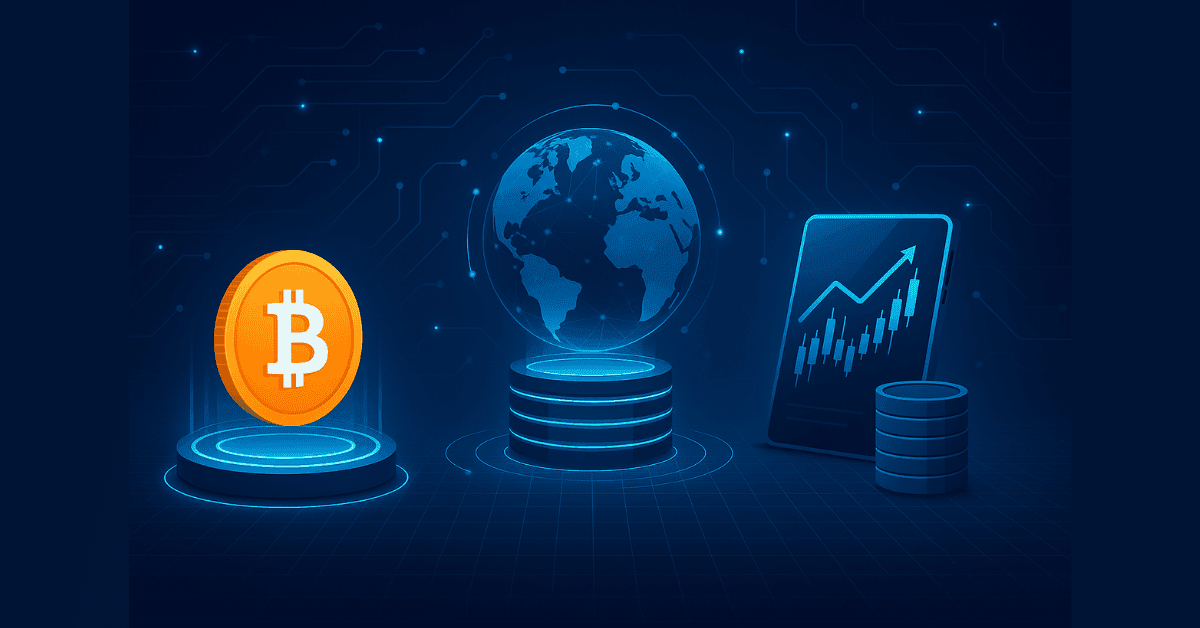
Crypto and Its Role in the Modern Digital Economy
In today’s globally digitalized world, cryptocurrency (crypto) is emerging as one of the most advanced forms of money. While traditional currency has long been seen as the “key” to operating market economies, crypto is increasingly viewed as a core tool for the future digital economy — decentralized, transparent, and globalized.
1. What is Crypto?
Cryptocurrency is a form of digital money that uses blockchain technology and cryptography to verify, secure, and record transactions. Unlike fiat currencies controlled by central banks, crypto operates on a decentralized system, allowing peer-to-peer transactions without the need for intermediaries.
Prominent examples include:
-
- Bitcoin (BTC): The first and most widely known cryptocurrency.
-
- Ethereum (ETH): A blockchain platform supporting smart contracts and decentralized apps (dApps).
-
- Stablecoins such as USDT and USDC, which are pegged to stable fiat values like the USD.
2. The Nature of Cryptocurrency
Unlike physical cash or bank deposits, crypto exists only in digital form. Its value derives from community consensus, programmed scarcity (like Bitcoin's fixed supply), and its potential utility within the digital ecosystem.
Current forms of cryptocurrency include:
-
- Native cryptocurrencies: Bitcoin, Ethereum, Litecoin...
-
- Utility tokens: Used within platforms, such as Binance Coin (BNB), Chainlink (LINK)...
-
- Governance tokens: Allow holders to vote on protocol changes, such as AAVE, UNI...
-
- Stablecoins: Pegged to stable assets like USD or gold.
-
CBDCs (Central Bank Digital Currencies): Government-issued digital versions of fiat money.
3. The Role of Crypto in the Digital Economy
Crypto is no longer just a speculative asset — it is taking on functions that mirror or expand upon traditional money:
-
- Unit of account: Some countries and businesses now accept BTC, ETH as valid pricing and payment units.
-
- Global payment medium: Borderless and independent of the traditional banking system.
-
- Store of value: Bitcoin is often referred to as “digital gold,” especially during inflationary periods.
-
- DeFi utility: Crypto fuels decentralized finance — lending, borrowing, saving, and trading without intermediaries.
-
- Cross-border trade facilitator: Reduces costs and speeds up international transfers.
4. Who’s Participating in the Crypto Market?
The crypto ecosystem is attracting a diverse set of participants:
-
- Governments & Central Banks: Developing national digital currencies (CBDCs).
-
- Corporations & Enterprises: Companies like Tesla and MicroStrategy invest in BTC or accept crypto payments.
-
- Exchanges & Investment Funds: Platforms like Binance, Coinbase, Grayscale provide liquidity and investment products.
-
- Retail Investors & Individuals: Participate in trading, farming, staking, and holding.
-
- Developers & Blockchain Startups: Build decentralized applications (dApps), NFTs, GameFi platforms, and more.
5. Conclusion
Crypto is redefining the concept of money in the 21st century. No longer just a means of payment, it represents a new asset class and the foundation of a transparent, decentralized, and open financial system. However, with great potential comes challenges — participants must equip themselves with knowledge, understand how the system works, and follow regulatory standards to help create a safe and sustainable crypto market.